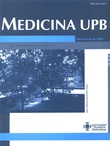Experiencia diagnóstica y de atención integral de enfermedad de Refsum en el Hospital Pablo Tobón Uribe
Contenido principal del artículo
Resumen
Objetivo: Describir la experiencia clínica y de diagnóstico de la enfermedad de Refsum con base en las guías de atención por un grupo interdisciplinario de errores innatos del metabolismo. Tipo de estudio: Reporte de caso. Métodos: Se realizó revisión retrospectiva de la historia clínica y seguimiento al paciente remitido al Hospital Pablo Tobón Uribe, con sospecha clínica de error innato de metabolismo, con enfermedad de Refsum, a quien se le implementó guía de atención integral para esta patología. Conclusiones: La utilización de la guía de atención clínica diagnóstica y terapéutica integral de errores innatos del metabolismo facilitó el abordaje temprano del paciente al igual que de apoyo para la familia, mejorando la calidad de vida.
Referencias
Tapia Ceballos L. Síndrome metabólico en la infancia. Ann Pediatr.2007;66(2):159-166.
Braverman N, Eichler F. Peroxisomal disorders and neurological disease. In: Squire LR, editor. Encyclopedia of neuroscience. San Diego: Academic Press;2009. p. 579-588.
Finsterer J, Regelsberger G, Voigtländer T. Refsum disease due to the splice-site mutation c.135-2A>G before exon 3 of the PHYH gene, diagnosed eight years after detection of retinitis pigmentosa. J Neurol Sci.2008;266(1-2):82-186.
Merkenschlager A, Matzen P, Gräfe G. Neuroorthopädie und neuropädiatrie. In: Matzen P. Kinderorthopädie. Munchen: Urban and Fischer Verlag; 2007. p. 515- 579.
Audo I, Robson AG, Holder GE, Moore AT. The Negative ERG: clinical phenotypes and disease mechanisms of inner retinal dysfunction Surv Ophthal..2008;53(1):16- 40.
Rapin I, Gravel J. Auditory neuropathy: physiologic and pathologic evidence calls for more diagnostic specificity. Int J Pediatr Otorhinolaryngol.2003;67(7):707-728.
Elshorbagy AK, Gjesdal CG, Nurk E, Tell GS, Ueland PM, Nygård O, et al. Cysteine, homocysteine and bone mineral density: A role for body composition?. Bone.2009;44(1):1-5.
Levy SD, Goldsmith. LA The peeling skin syndrome.J Am Acad Dermatol.1982;7(5):606-613.
Llevadot J, Vaca FB, González Sastre F. Determinación y utilización de la concentración plasmática de homocisteína en la práctica clínica- Med Clín.2005; 124(14):544-553.}
Sharrard M, Pollitt R. Metabolic screening in children: newborn screening for metabolic diseases past, present and future. Paediatr Child Health.2007;17(7):273- 278.
Fernández L. Errores innatos del metabolismo: aspectos preventivos. Vox Pediátrica.1999; 7(1):49- 55.
Thompson JD, Glass M. Genomics and population screening: example of newborn screening. In: Willard H, Shapiro G, editors. Genomic and personalized medicine. San Diego: Academic Press;2009. p. 470- 480.
Vockley J. Newborn screening: after the thrill is gone. Mol Genet Metab. 2007;92(1-2):6-12
Campeau PM, Scriver CR, Mitchell JJ. A 25-year longitudinal analysis of treatment efficacy in inborn errors of metabolism. Mol Genet Metab, 2008;95(1- 2):11-16.
Trahms C. Inborn errors of metabolism ,In: Coulston AM, Rock CL, Monsen ER, editors. Nutrition in the Prevention and Treatment of Disease. Seattle, WA: University of Washington; 2001. p. 209-225.
Liu Y, Björkman J, Urquhart A, Wanders RJA, Crane DI, Gould SJ. PEX13 Is Mutated in Complementation Group 13 of the Peroxisome-Biogenesis Disorders. Am J Hum Genet..1999;65(3):621-634.
Weller S, Cajigas I, Morrell J, Obie C, Steel G, Gould SJ, Valle D. Alternative splicing suggests extended function of PEX26 in peroxisome biogenesis .Am J Hum Genet.2005;76(6):987-1007.
Watkins PA, Mihalik SJ, Skjeldal OH. Mitochondrial oxidation of phytanic acid in human and monkey liver: implication that refsum’s disease is not a peroxisomal disorder.Biochem Biophy Res Commun. 1990;167(2):580-586.
James L, Andrew M. Diagnosis and early management of inborn errors of metabolism presenting around the time of birth. Acta Pediátrica. 2006; 95: 6-14.
Kaplan AA. Therapeutic plasma exchange: core curriculum. Am J Kidney Dis. 2008;52( 6):1180-1196.
Maurer M, Burri S, de Marchi S, Hullin R, Martinelli M, Mohacsi P et al. Plasma homocysteine and cardiovascular risk in heart failure with and without cardiorenal syndrome. Int J Cardiol.2009 Jan 30 [Epub ahead of print]
Foussas SG, Zairis MN, Makrygiannis SS, Manousakis SJ, Patsourakos NG, Adamopoulou EN et al. The impact of circulating total homocysteine levels on long-term cardiovascular mortality in patients with acute coronary syndromes Int J Cardiol. 2008;124(3):312-318.
Grattagliano I, Palmieri VO, Portincasa P, Moschetta A, Palasciano G Oxidative stress-induced risk factors associated with the metabolic syndrome: a unifying hypothesis. J Nutr Biochem2008;19( 8):491-504.


